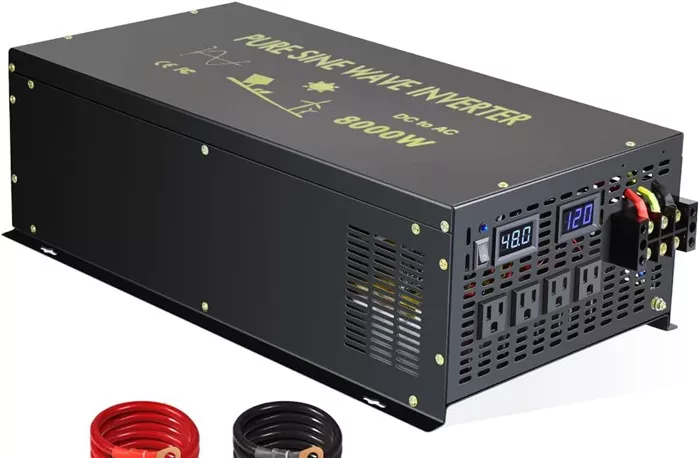In recent years, solar generators have gained significant traction as viable energy solutions for both residential and commercial applications. Among these, the 8000-watt solar generator stands out for its impressive power capacity. But is the 8000-watt solar generator cost-effective? This article delves into the economics of owning an 8000-watt solar generator, evaluating its initial investment, operational costs, potential savings, and environmental impact.
Understanding Solar Generators
What Is a Solar Generator?
A solar generator comprises solar panels, a battery storage system, an inverter, and a charge controller. It converts sunlight into electricity, stores it in batteries, and provides power as needed. The capacity of the generator is determined by the wattage it can provide, with an 8000-watt generator capable of powering several appliances simultaneously.
Components of an 8000-Watt Solar Generator
- Solar Panels: The efficiency of the solar panels directly impacts how quickly the generator can recharge. High-efficiency panels can generate more electricity in less time.
- Battery Storage: The battery’s capacity determines how much energy can be stored for later use. An 8000-watt generator typically features large lithium-ion batteries for efficient energy storage.
- Inverter: This device converts the DC power generated by the solar panels into AC power, making it usable for most household appliances.
- Charge Controller: This component regulates the voltage and current coming from the solar panels to prevent battery overcharging.
Cost Analysis of an 8000-Watt Solar Generator
Initial Investment
The initial cost of purchasing an 8000-watt solar generator can vary widely based on brand, components, and features. On average, the price can range from $2,000 to $5,000.
Factors Influencing Cost
- Quality of Components: Higher-quality solar panels and batteries generally come at a premium but offer better efficiency and longevity.
- Brand Reputation: Established brands may charge more due to their proven reliability and customer service.
- Installation Costs: While many solar generators are portable and do not require installation, additional costs may be incurred for mounting solar panels or configuring a more permanent system.
Operational Costs
Once installed, the operational costs of an 8000-watt solar generator are relatively low.
Energy Costs
- Free Energy Source: Solar energy is free once the system is installed. This leads to significant savings on electricity bills, particularly in sunny regions.
- Maintenance Costs: Regular maintenance, such as cleaning solar panels and checking battery health, incurs minimal costs compared to traditional generators.
Potential Savings
Owning an 8000-watt solar generator can result in substantial savings over time.
Electricity Bill Savings
The average household consumes about 877 kWh per month, which translates to approximately 29 kWh per day. An 8000-watt solar generator can significantly offset these energy needs, especially if coupled with a solar panel array.
- Monthly Savings: If the generator can cover 50% of a household’s energy consumption, monthly savings could reach $50 to $100, depending on local electricity rates.
- Annual Savings: Over a year, this translates to savings of $600 to $1,200.
Return on Investment (ROI)
Calculating the return on investment is crucial for determining the cost-effectiveness of an 8000-watt solar generator.
- Payback Period: Assuming an initial investment of $3,000 and annual savings of $1,200, the payback period would be approximately 2.5 years. After this period, the generator would start paying for itself through continued savings.
- Increased Property Value: Solar installations can increase property value, further enhancing the ROI.
Environmental Impact
Reducing Carbon Footprint
One of the significant benefits of solar generators is their ability to reduce greenhouse gas emissions. Traditional generators often rely on fossil fuels, contributing to air pollution and climate change. By contrast, solar generators produce clean energy, helping to mitigate these environmental impacts.
Incentives and Rebates
Many governments offer financial incentives for installing solar energy systems, including tax credits and rebates. These incentives can significantly reduce the initial cost of an 8000-watt solar generator, making it more cost-effective.
Limitations of an 8000-Watt Solar Generator
Weather Dependency
Solar generators rely on sunlight, which means their efficiency can fluctuate with weather conditions. In regions with limited sunlight, the generator may not generate enough power, leading to increased reliance on the grid.
Upfront Costs
Despite the potential long-term savings, the initial investment can be a barrier for many homeowners. Financing options and incentives can alleviate this challenge, but upfront costs remain a consideration.
Limited Continuous Power Output
While an 8000-watt generator can handle many household appliances, it may not be sufficient for high-demand applications like electric heating systems or large HVAC units.
see also: What Size Generator to Run a 12,000 BTU AC?
Conclusion
An 8000-watt solar generator can be a cost-effective solution for many homeowners, especially those in sunny climates. With minimal operational costs, potential savings on electricity bills, and environmental benefits, the investment often pays for itself over time. However, prospective buyers should consider local weather conditions, upfront costs, and their specific energy needs before making a decision. Overall, for those seeking a sustainable and economically viable energy source, an 8000-watt solar generator is certainly worth considering.
FAQs:
How long does an 8000-watt solar generator last?
With proper maintenance, an 8000-watt solar generator can last for 20 years or more, especially if high-quality components are used.
Can an 8000-watt solar generator power an entire house?
It can power most household appliances but may not be sufficient for high-demand systems like HVAC units.
How long does it take to charge an 8000-watt solar generator?
Charging times depend on solar panel efficiency and sunlight availability, but it typically takes several hours to a full day to fully charge.
Are there financing options available for solar generators?
Yes, many companies offer financing options, and various government incentives can reduce the overall cost.
Can I use an 8000-watt solar generator for off-grid living?
Yes, an 8000-watt solar generator can be an excellent solution for off-grid living, providing reliable power in remote locations.
Related topics:
- Top 8 Best Micro Solar Generators for Efficient Power on the Go
- Top 5 Most Reliable Solar Generators
- Key Considerations for Using a Whole-House Generator with Solar Panels

